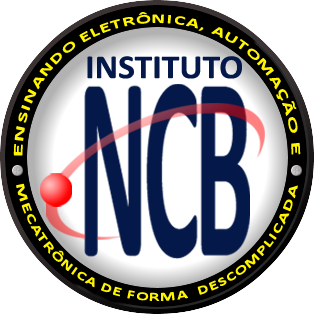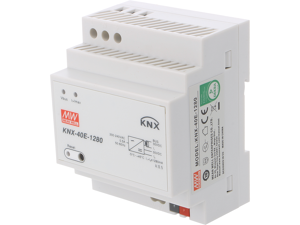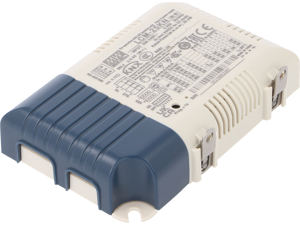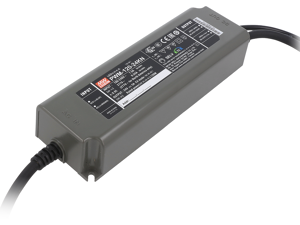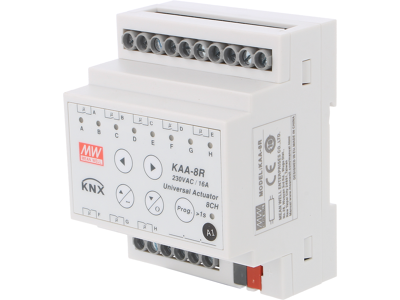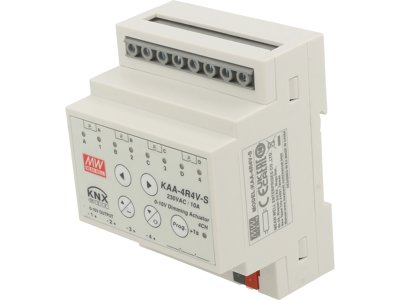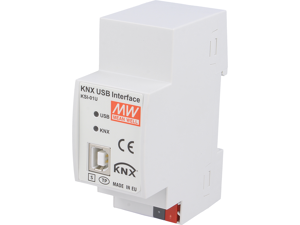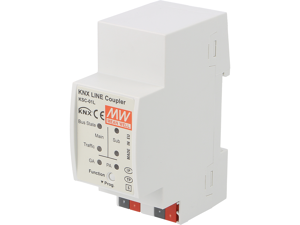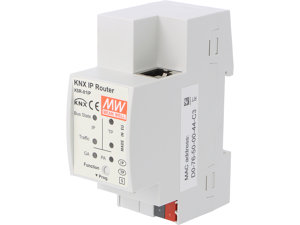Over the last decades, Mean Well has become one of the most recognizable global providers of power supply modules and converters. However, its product range also includes a broad selection of other solutions, such as KNX equipment for building automation systems.
The assortment described below includes modules compatible with the KNX system, i.e. a standard applied in home and industrial automation systems. They are used to control diverse consumers, for example actuators, motors or components with DALI interfaces for typical illumination systems. Mean Well offers numerous universal solutions for control, but also for the designing and scaling of KNX systems.
KNX AUTOMATION SYSTEMS
KNX is an open source, international standard for building automation systems that facilitates the control of illumination systems, actuators (gates, shutters, electromagnetic locks), ventilation/air conditioning systems (HVAC in its broadest sense), as well as monitoring or alarm systems (including anti-intrusion systems). A range of KNX-compatible consumer electronics products and white goods are now available. As a result, various complex systems can be created, managed, documented, and diagnosed using dedicated software.
Power supply for the KNX components
The first group of KNX-compatible products offered by Mean Well includes two series of power supply modules, namely KNX-20e and KNX-40e, both designed to supply diverse consumers, mostly drivers connected to the KNX networks (30 V DC output and power up to 38.4 W). They operate at standard mains voltage (180–264V AC) or direct current sources (e.g. 254–370 V DC).
The LCM and PWM series include products for LED illumination systems. These are panel-mounted, constant-current (LCM, 350–1050 mA or 500–1400 mA) or constant-voltage products (PWM, 12–48 V DC). They simplify system design by eliminating the need to install additional gates for controllers, as the units can directly activate and control consumers such as LED strips, lamps or lanterns (within the basic range). The converter power rating is up to 200 W (selected models).
Note also that, in addition to their basic functionality, all these KNX-compatible converters ensure mutual synchronization of operation and remote monitoring of power supply parameters (voltage, current, energy consumption).
KNX drivers and other equipment from the KAA series
Apart from power supply modules, Mean Well provides a range of drivers, interfaces and other auxiliary devices used to design KNX systems. They are suitable for DIN rail mounting (35 mm), which further expands their range of application, even when it comes to retrofitting work on existing systems.
The first product group includes basic drivers, i.e. relay drivers used to actuate motors, actuators, heaters, solenoid valves, etc. They feature eight channels and contacts with current-carrying capacity of 10 A or 16 A. They provide the simplest solution for remote control of consumers. As far as devices designed for LED illumination are concerned, they can additionally be used to dim the lights, for example to control their intensity and activate them with a gradual brightness enhancement effect (linear or logarithmic mode). This functionality is fully integrated with the driver circuit to use the same power source, which greatly simplifies installation/wiring.
KNX system design and scaling
In the table above, you can see elements used to design and scale KNX networks. As the name suggests, a KNX-USB interface provides network access via any desktop computer/laptop equipped with a USB module. Such connections may be required for programming or diagnostic purposes, e.g. to adjust single controller settings. A universal serial interface can also be used to integrate a less typical device with a KNX system, e.g. a single-board computer to be configured as a remote access/control gateway. The switch/repeater comes with two RJ-45 sockets to facilitate connecting or extending network “branches” in a manner eliminating conflicts and interferences thanks to galvanic port insulation and to filtering telegrams (packages) in line with a specific hierarchy which the user can define.
An Ethernet-KNX router makes it possible to use a LAN infrastructure (and also, indirectly, the wireless WLAN infrastructure) to support a KNX system. Such a solution comes particularly handy in areas where routing new cable runs would require refurbishment work, as well as in system modernization, servicing and scaling. The router is configured via an interface that is accessible from a web browser.
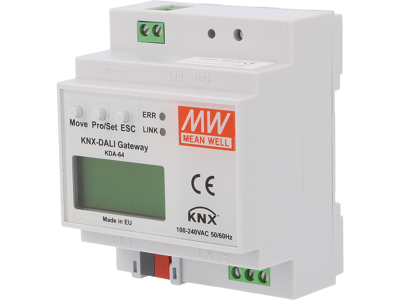
Operation with DALI interface
KNX is a powerful, but still generic standard for control/automation system communication and organization. Therefore, in various set-ups, it may be necessary to integrate it with much more specialized solutions, such as the DALI interface (Digital Addressable Lighting Interface) used in the field of illumination system design. For example, DLC-02-KN is a gate with an output to two DALI-2 buses to operate a total of 128 control devices (ECG, Electronic Control Gear). Therefore, even very complex illumination systems (residential interiors, offices, and façade/architectural illumination systems) can be integrated with a broader-purpose building automation system. DALI gates ensure access to the diverse capabilities offered by this interface (e.g. RGBW LED strip colour and intensity adjustment, dimming/brightening rate setting, etc.), while also simplifying the presetting of individual functions and entire arrangement programs which a user can activate via any available interface (smartphone app, wall switch, automatic/timer triggering).
